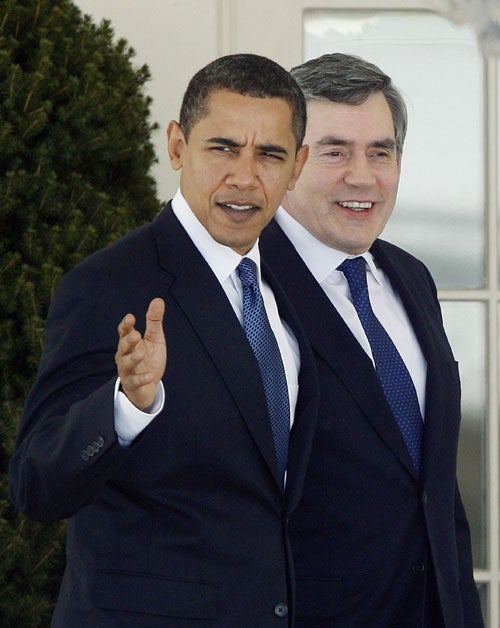Brown 'lurches from disaster to disaster', said ambassador

A scathing assessment of Gordon Brown's "abysmal track record" by American officials based in London has been revealed in the latest leaks of US diplomatic cables.
The US embassy portrayed Mr Brown as lurching from "political disaster to disaster" and leading a "rudderless" party only a year after he succeeded Tony Blair as Prime Minister in 2007.
Diplomatic messages published on the WikiLeaks website also show that Barack Obama's allies were irritated by Mr Brown's intense manner. He interrupted a Thanksgiving call to the current ambassador Louis Susman to lobby for a global tax on financial transactions in the face of US opposition. "Prime Minister Brown continues to press hard ... despite being fully aware of US opposition to the tax," he wrote a year ago.
Although they highlighted his pivotal role in the global financial crisis, the Americans appeared to treat some of Mr Brown's initiatives, such as food summits, global disarmament and a UK national security council, with indifference. Mr Susman said Mr Brown was using the proposed transaction tax "for domestic political gain but also for reasons of 'social justice'.... The Prime Minister's position is largely being driven by domestic politics, as a way to be seen as 'punishing the banks'."
Robert Tuttle, who was George Bush's last ambassador to London, told Washington that Labour missed Mr Blair's "charisma" after his departure. "For a party that still contains a large element who feel more comfortable in opposition ... self-questioning contributes to a feeling of post-Blair rudderlessness. Even though Blair ended up unpopular, he was the sun around which the party orbited. Brown's earnest and praiseworthy vision excites no opposition and yet it seems to excite no great enthusiasm either."
A series of messages were sent when Mr Brown was plunged into his first leadership crisis by Labour's humiliating defeat by the Scottish National Party at the Glasgow East by-election in July 2008. The ambassador wrote: "As Gordon Brown lurches from political disaster to disaster, Westminster is abuzz with speculation about whether he will be replaced as Prime Minister and Labour Party leader, and, if so, by whom ... A terrible by-election defeat ... has left the Labour Party reeling and fuelled fears among MPs that Brown's leadership may now be beyond repair."
Mr Tuttle later added: "We don't see a clear tipping point on the horizon – but given Brown's abysmal track record over the last year, that day could come when Labour MPs return from vacations in August/September."
US diplomats reported back about the rules for replacing a Labour leader and Mr Brown's likely successors. They included David Miliband – but not his brother Ed, now the party leader. At one Labour conference, the "frisson of excitement whenever the Foreign Secretary, David Miliband, appeared was palpable," officials said.
The embassy's view of Mr Brown improved in the autumn of 2008 when he led the way in recapitalising banks after Lehman Brothers collapsed. "After a year of plummeting poll numbers and questions about his ability to lead, Gordon Brown is suddenly riding high," Washington was told.
But, by the spring of 2009, US officials described Labour as a "sinking ship". One cable said: "We assess it unlikely that any Labour politician with his or her eye on the future would want to take on the sinking ship that is the current Labour Party at this time of crisis. It is more likely that Labour will go down in the next election – and then will begin the process of rebuilding."
A month later, the London embassy reported: "A wounded, but still standing, Gordon Brown remains at the helm of his party and is likely to do so until the voters speak in the next election ... The man who has nursed his dream – and grievance – of being Prime Minister since 1994 is not going to walk out of Downing Street now."
America's view of...
Alan Johnson "Pushes all the right personal buttons... but his lack of killer instinct makes him more suitable as a deputy rather than Prime Minister."
Ed Balls "His public speaking is derided as 'dull', his slightly awkward manner as 'charmless', and he has enemies in the party."
Shriti Vadera (fomer business minister) "Private secretary told us Vadera would regularly scream, 'Get me a cup of coffee' with a string of expletives."
Join our commenting forum
Join thought-provoking conversations, follow other Independent readers and see their replies
Comments
Bookmark popover
Removed from bookmarks